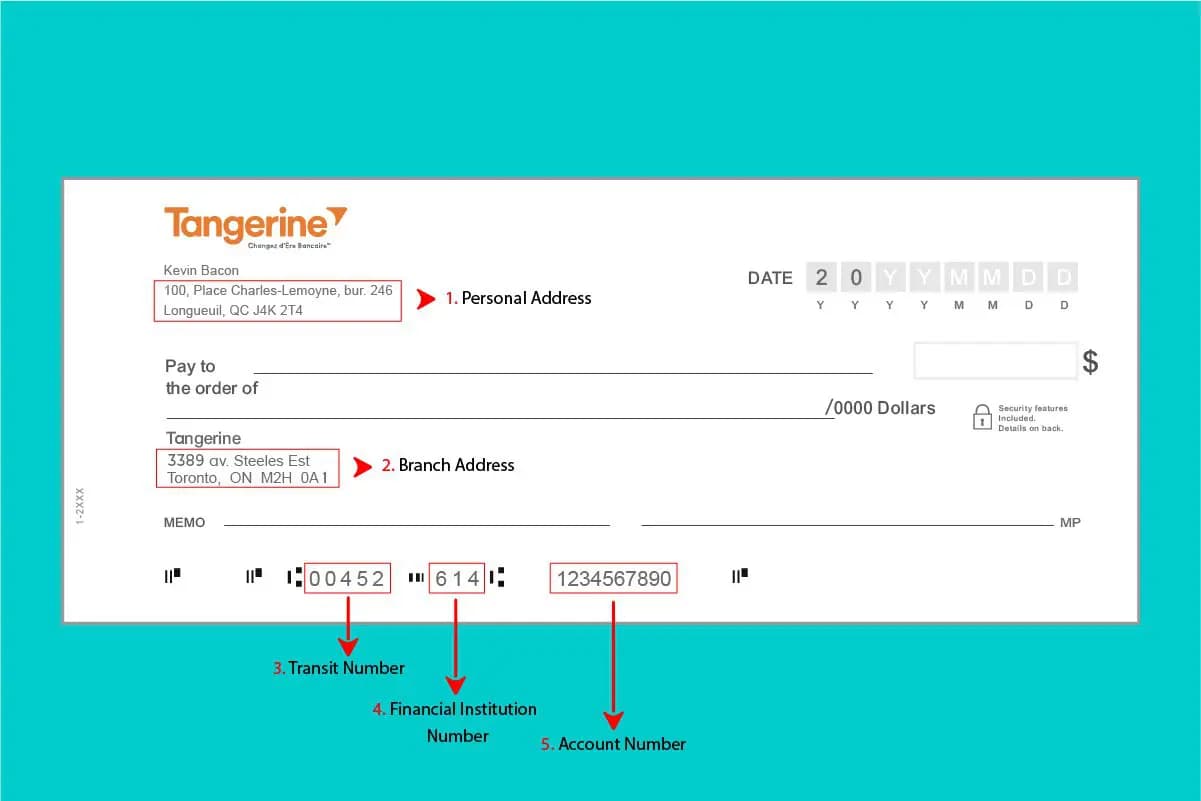Tangerine sample cheque: everything you need to know to find it and understand it
By Julien Brault | Published on 02 Mar 2022

From pre-authorizing payments to getting paid, sample cheques still come in handy… even though cheques are rarely used in Quebec and Canada. The main reason you need a Tangerine sample cheque is to share your banking information with someone else.
Understanding Your Tangerine Sample Cheque
If you know what the numbers at the bottom of your Tangerine sample cheque mean, you can probably just share those numbers… without having to go looking for a Sample Cheque in your banking portal every time someone asks for a sample cheque.
So, here are the important features of a cheque in Canada that you should be able to recognize by looking at a cheque:
1. Your home address
This is information you don’t need to look at a sample cheque to know. However, this information is often needed by those who ask you for a sample cheque.
2. Your bank branch address
Since Tangerine is an online bank, this address does not vary, as all Tangerine customers share the same “branch”, which is actually the Tangerine Cafe located downstairs at Tangerine’s headquarters in Toronto. This address is therefore the same for all Tangerine customers: 3389 Steeles Avenue East, Toronto, Ontario, M2H 0A1
3. The Transit Number
This is a 5-digit number that identifies the bank branch to which your bank account is associated. Since Tangerine is an online bank, all of its customers in Canada are attached to the same “branch”. In the case of Tangerine, this number is always the same, 00152, which is not the case for other banks.
4. The Institution Number
The institution number is a three-digit number that identifies the financial institution you are dealing with, regardless of the branch you have chosen. Tangerine’s institution number is 614.
5. Your account number (or folio number)
The account (or folio) number is the identifier for your bank account. Without the transit number and institution number, it cannot be used to transfer money, but it is the most sensitive information you will find on your sample cheque, as it is the number that is associated with your bank account. This number varies in length depending on the financial institution, but Tangerine account numbers are always 10 digits long.
How to find your sample cheque on the Tangerine online portal
Before the Internet, a sample cheque was a paper cheque with “SAMPLE” written on it to ensure that the cheque could not be used. If you have a chequebook, you can still do this. In fact, a sample cheque is a document that contains all the information displayed on a cheque, so you can still do it that way.
For those who don’t want to waste paper, or who simply don’t have a chequebook, it is possible to obtain a Tangerine sample cheque by logging into the Tangerine online portal. Here are the steps to download a Tangerine sample cheque in PDF format with just a few clicks:
- Log into your Tangerine account using the following link: https://www.tangerine.ca/en
- Click on the account for which you would like a sample check
- Under your balance, click on the “Sample Cheque” button.
- A PDF document containing your sample cheque should open in your browser; all you need to do is download it.
Now you know everything you need to know about finding your Tangerine sample cheque, and how to interpret the different elements on it! Furthermore, you should now be able to write a cheque.